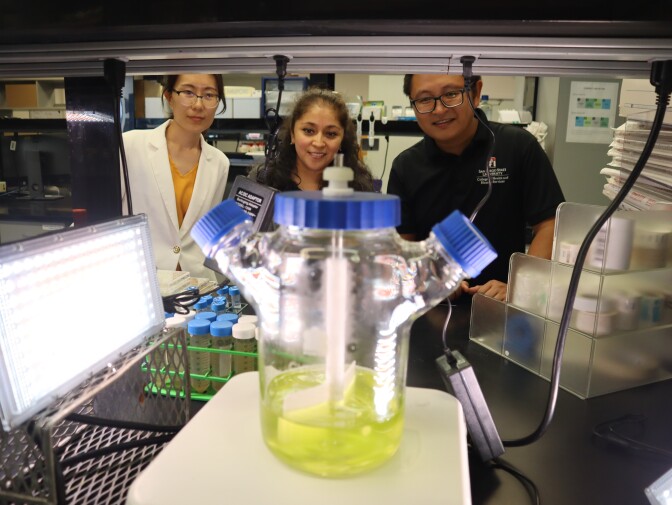Usually it’s not a big deal to ask for more guacamole, though it might cost extra depending on where you go. But if you want an extra scoop of this very special version of the popular dip, you’ll have to work it out with your crewmates.
Researchers at San Diego State University are developing “space guacamole,” a non-expiring dried formula that turns into a proper dip when water is added. The aim is to give astronauts much-needed nutrients — and a taste of home — when they’re on missions far above the Earth’s atmosphere.
“It’s a dry, kind of like an instant-mix guacamole, so we have to make sure that the color, the texture, the flavor after you reconstitute it are still good,” said Changqi Liu, a food science professor at SDSU.
Adventurous home chefs have added all kinds of things to guacamole, from peas to squid ink. But this guac will be enriched with algae — for a good reason.
Why algae?
The algae being used can grow in space and they’re rich in nutrients, which are in short supply far above the atmosphere. They also have lots of antioxidants, which will help astronauts keep the effects of space radiation at bay.
Currently, the researchers are considering a few different algae for their final recipe based on their color and taste profiles. Some of the algae taste more like seaweed, with an umami-forward flavor, while others have a distinct fishy or bitter aftertaste that may taste jarring in guacamole, according to the researchers.
“We have all tasted the algae actually,” Liu said. “I mean, they don’t taste bad.”
Determining which algae to use is where SDSU biologist Cristal Zuniga’s research comes in. She and her team are working on developing genetically modified algae that would give more nutrients to astronauts, as well as a green color that blends well with guacamole.
One of the challenges the team is facing is how to formulate the guacamole, since it will need to be dried and fit the specifications for space flight.
“This is the first time our team worked with space food,” said SDSU food scientist Jing Zhao. “But in general, they won't be able to carry a lot of food items into space, so lightweight would be a requirement.”
NASA awarded Zuniga, Liu and Zhao a grant in August to develop the space guacamole.
The researchers hope to finalize their recipe soon, though they anticipate there may be some back and forth with astronauts on the nitty-gritty of the recipe, since being in space can affect the taste of different foods.
The researchers also hope that the space guacamole will eventually be available on Earth. This would be particularly useful for people who have trouble accessing nutritious food — as well as anyone else who’s tired of their avocados going brown as soon as they come home from the store.









